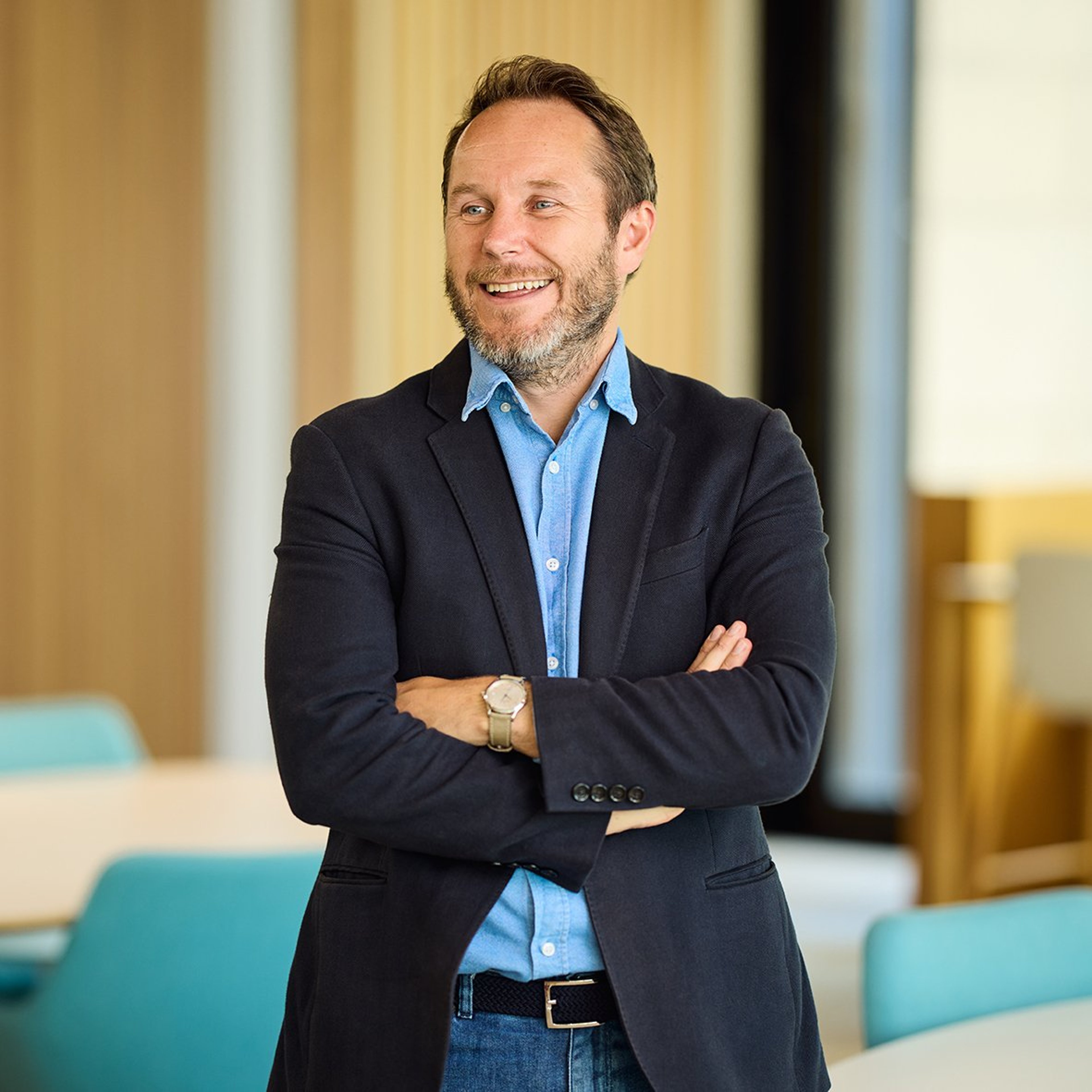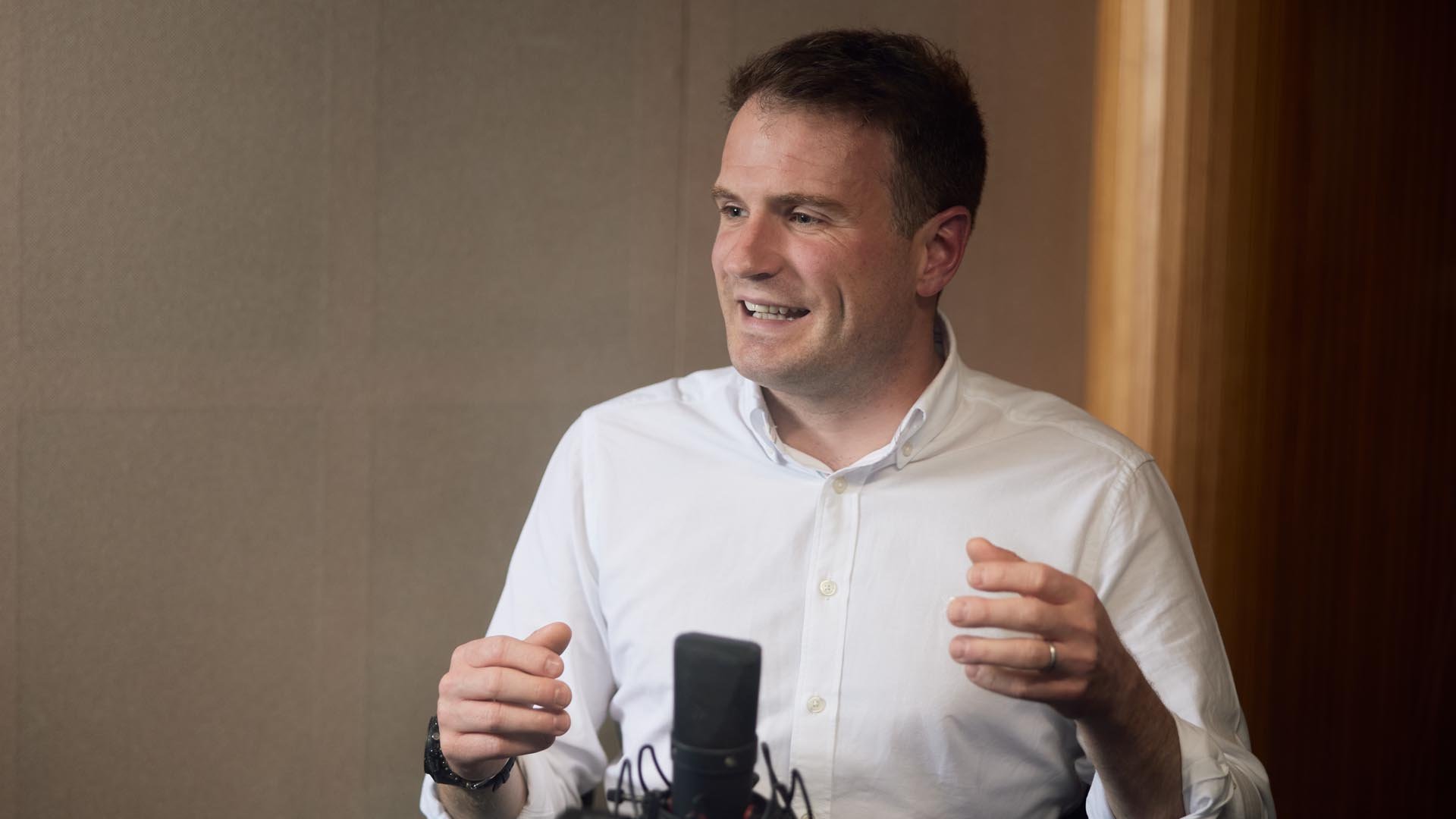
Illustration by Andrew Lyons
Please remember that the value of an investment can fall and you may not get back the amount invested. This article originally featured in Baillie Gifford’s Spring 2022 issue of Trust magazine.
A journey to Helsinki for what is arguably Europe’s premier tech start-up event promised to be an invigorating adventure.
December is a frosty time to visit the Finnish capital. Daytime temperatures are below 10C and locals walking along the cobbled streets past the Tuomiokirkko – its multi-domed Lutheran cathedral – and along to Market Square’s stalls need several layers of clothing to protect themselves against the wind blowing in over the Baltic Sea.
A 15-minute drive inland, the city’s expo centre offers attendees a warmer welcome. Inside, the appropriately named Slush conference houses a bustle of founder leaders, product developers, venture capitalists and other investors.
Its purple-neon lights and geometric stage backdrops look more like an A-list nightclub than a gathering for entrepreneurs and dealmakers. And the relaxed setting encourages many of the invitees to sport an assorted array of jumpers and colourful sneakers rather than the formal attire traditionally found at business meetings.
This is an exciting time for European innovation. A flood of capital is making it easier for start-ups to survive and scale than ever before. And the ambition to do so is there.
More than $120bn flowed into the continent’s tech industry in 2021, according to the State of European Tech, a study Baillie Gifford sponsored to coincide with Slush. That’s 10 times the level of 2015.
And 100 young European companies achieved unicorn status, meaning each is valued at more than $1bn.
They have been inspired by the success of others.
Payments platform Adyen, computer chip manufacturing specialist ASML, and music and podcast streamer Spotify – which are among Baillie Gifford European Growth Trust’s holdings – have shown what can be achieved when companies realise their potential. They count among members of our portfolio whose market value has surpassed $10bn.
The report indicates a total of 26 European tech firms have now achieved this status, which is more than double the number at the end of 2020.
Consequently, many European entrepreneurs no longer want their firms on the menu to be bought and swallowed by another continent’s tech giants.
Baillie Gifford’s reputation for being a supportive long-term investor means we are actively invited to participate in pre-IPO funding rounds by the leaders of fast-growing disruptors. And we are also often sought out as a preferred partner by venture capital funds such as Atomico, which might have already taken a stake at an earlier stage. These are higher quality leads than we would get by relying on investment banks.
To make the most of these opportunities, we gained approval at Baillie Gifford European Growth Trust’s recent AGM to raise the cap on how much of its portfolio can be invested in private companies from 10 to 20 per cent (at the time of investment) in 2022.
So the point of travelling 1,700km to Slush was to raise our profile and break the ice with new potential partners.
It was therefore hugely disappointing to have to cancel our flights and hotel at the last minute because of the spread of the Omicron Covid-19 variant. Although there was no travel ban, the risk of being put into quarantine on our return was too great given our other responsibilities.
That limited us to watching interviews livestreamed from the two cyber-inspired stages rather than attending in person, using Slush’s matchmaking service instead of serendipity to make new contacts, and firing off bullet points via a chat app to share observations among ourselves rather than huddling over hot drinks.
Even so, it proved worthwhile.

Its purple-neon lights and geometric stage backdrops look more like an A-list nightclub than a gathering for entrepreneurs and dealmakers

A message from multiple sessions was that European tech companies are benefiting from a flywheel effect in which a growing talent pool produces more ideas, which attract investment, which in turn allows companies to grow and attract further talent.
The rise of remote working and the growing use of English as the default business language have helped young European companies hire from a wider cohort. And a multiplier effect also comes into play because a higher-quality workforce encourages others to seek to join too.
This helps attract international finance. Capital invested in the European technology ecosystem was about three times higher in 2021 than the previous year, and larger funding rounds are becoming the norm.
This gives companies the ability to scale more quickly and lock in first-mover advantages.
European start-ups now typically have global ambitions from the get-go. But the fact they also need to be hyperlocal in the way they expand across the continent helps hone them for further international growth in a way a Silicon Valley company stretching from California to New York doesn’t experience.
They also tend to be more patient than their US rivals, taking time to ensure they do the hard things well in contrast to just pushing out code to see what works. As recipe box delivery business HelloFresh has demonstrated, that can be critical when there’s a competitive shakeout that causes companies with weaker operational performance to fail.
Because many start-ups don’t survive, the research we put into our selection and the access we get to fresh perspectives are critical. And if we get it right, the winners’ growth in value should more than cover the failures’ costs by a significant margin – while the experience gained from both will make us better stock-pickers over time.
With that in mind, we have already met the founder of an Eastern European unicorn who was at Slush. We are also in touch with other new contacts made virtually via the event.
And, Covid permitting, we’ll be in Helsinki in November 2022 to play a prominent role at the next gathering.
You can read Atomico’s State of European Tech 2021 report at stateofeuropeantech.com
This article first appeared in the Spring 2022 issue of Trust, Baillie Gifford’s bi-annual investment trust magazine. To register for a free copy, delivered to your door or to your inbox please visit bailliegifford.com/trust
Quotes from Slush’s stage

Investments with exposure to overseas securities can be affected by changing stock market conditions and currency exchange rates. The Trust’s risk could be increased by its investment in private companies. These assets may be more difficult to sell, so changes in their prices may be greater.
The views expressed in this article should not be considered as advice or a recommendation to buy, sell or hold a particular investment. The article contains information and opinion on investments that does not constitute independent investment research, and is therefore not subject to the protections afforded to independent research.
Some of the views expressed are not necessarily those of Baillie Gifford. Investment markets and conditions can change rapidly, therefore the views expressed should not be taken as statements of fact nor should reliance be placed on them when making investment decisions.
Baillie Gifford & Co Limited is wholly owned by Baillie Gifford & Co. Both companies are authorised and regulated by the Financial Conduct Authority and are based at: Calton Square, 1 Greenside Row, Edinburgh EH1 3AN.
The investment trusts managed by Baillie Gifford & Co Limited are listed on the London Stock Exchange and are not authorised or regulated by the Financial Conduct Authority.
A Key Information Document is available by visiting bailliegifford.com





